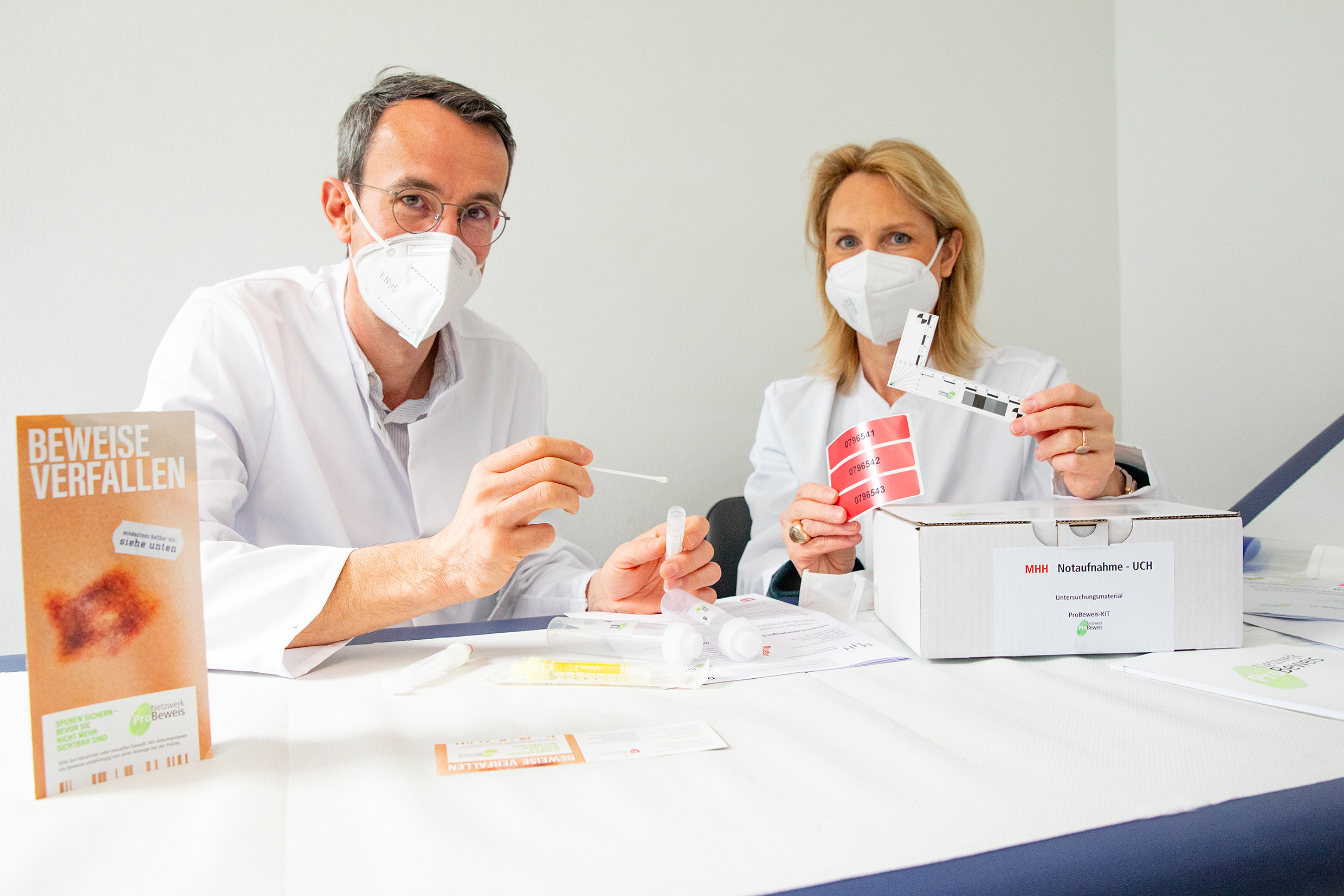Confidential help: Medical staff in trauma surgery secure traces of domestic and sexual violence.

Professor Dr Stephan Sehmisch (left) and Professor Dr Anette S. Debertin. They are holding material for examination and securing evidence in their hands; Copyright: Karin Kaiser/MHH.
18.03.2022
Every third woman in Germany experiences physical and/or sexual violence at least once in her life. However, it is rare for a report to be filed with the police immediately after the crime. The ProBeweis network can still help those affected. In the contact points, trained physicians secure and document the traces of violence - even if no report is made at first. So far, there have been 39 of these contact points throughout Lower Saxony. Now another one has been added: the Central Emergency Room (ZNA) of the Hannover Medical School (MHH). Doctors from the Department of Trauma Surgery take care of the patients in the emergency room. In addition to the Institute of Forensic Medicine and the Clinic for Gynaecology and Obstetrics as well as the branch of Forensic Medicine in Oldenburg, the Central Emergency Room is now the fourth point of contact at the MHH.
Domestic violence case numbers at a high level
"The steadily increasing number of registered cases of domestic violence emphasises the need for support for those affected," states Professor Dr. Anette S. Debertin from the Institute of Forensic Medicine. She heads the ProBeweis network. In 2020, the police in Lower Saxony registered around 21,500 acts of domestic violence. In most cases, these are perpetrated by the (ex-)partner.
"After experiencing violence, many of those affected first come to the emergency room of a clinic to have their injuries treated," reports Professor Dr Stephan Sehmisch, Director of the Clinic for Trauma Surgery. Often, the women and men affected do not address the violence they have suffered of their own accord. "But we see that the accident histories described do not match the injuries," explains the trauma surgeon. "The grey area of domestic violence is large. As the contact point of the ProBeweis network, we want to help those affected professionally here in the Central Emergency Department."
Forensic evidence
Many women and men do not press charges directly after the crime because they are ashamed, threatened or afraid that they might not be able to get through the stressful court proceedings. "For a possible later court case, however, it is important to secure traces such as strangulation marks, haematomas or DNA material in a professional and court-proof manner immediately after the crime and to document medical findings precisely," explains Professor Debertin. This is now possible in the MHH emergency room. The physicians were prepared for the new task in forensic medical training courses.
ProBeweis works absolutely confidentially
The evidence is kept for at least three years. The written documentation is archived for 30 years. The procedure in the ProBeweis network is confidential. "Only when a complaint is filed and we are released from our duty of confidentiality are findings handed over to the police and, if commissioned, a trial-relevant expert opinion is prepared," explains forensic pathologist Sarah Stockhausen from the ProBeweis team.
In 2021, the network documented 215 cases
Last year, the ProBeweis network documented a total of 215 cases of domestic and/or sexual violence in its contact points in clinics throughout Lower Saxony. About 50 per cent of the cases involved physical violence and 40 per cent sexual violence. About ten per cent involved combined acts. Of the 215 total cases, about 80 were investigated and documented at the MHH contact points
SERVICE:
For further information, please contact Professor Dr Anette S. Debertin, debertin.anette@mh-hannover.de, telephone (0511) 532-5533 and Professor Dr Stephan Sehmisch, sehmisch.stephan@mh-hannover.de, telephone (0511) 532-2026.